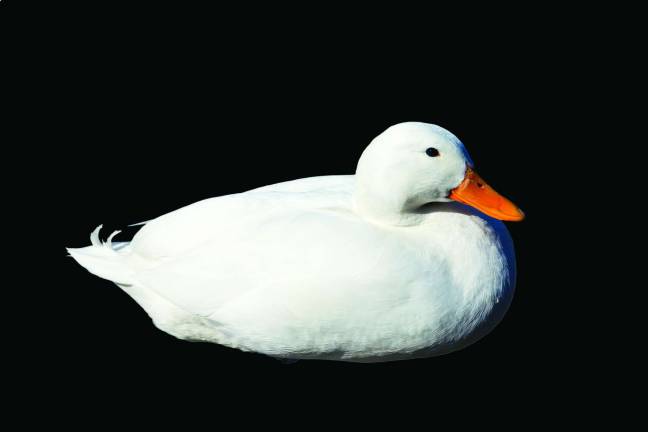Is it okay to eat foie gras?

Force-feeding is torturous and can be lethal
Looking past the debate of whether we should be eating animals at all, let’s consider the cruelties particular to foie gras production: the excruciating procedure done three times a day for three to four weeks while the ducks or geese are still very much alive. This force-feeding – the gavage – that proponents of foie gras claim to be humane, somehow threatens a 20 times higher mortality rate than birds conventionally raised, due to severe throat tissue damage, fractures, infection, and suffocation, among other horribly painful causes.
Foie gras enthusiasts claim the ducks enjoy the feedings, which consist of grabbing the animals from their overcrowded cages (by their necks or wings, often fracturing them), ramming a metal pipe down the bird’s throat (causing inflammation to and often tearing the delicate esophageal tissue lining) and pumping enormous quantities of food to produce a diseased and enlarged liver.
Practices that are cruelty-free don’t require complex evasion tactics. Yet visitors at foie gras facilities will never encounter the realities of forced feeding.
Dr. Holly Cheever, veterinarian and valedictorian of her class at Cornell University, describes one of her inspections of the Hudson Valley facility. “Instead of showing visitors the true production line, in which 15 to 20 workers move rapidly through their 350 birds each, fed three times daily, to produce the 6,000 birds they market weekly, guests are now shown a very staged feeding session in which two workers move slowly through pens of birds who are all in the early stages of their four-week feeding process, and therefore do not exhibit the pathetic ill-health (respiratory distress, epileptic seizures, inability to walk) of the birds in their final 10 to 14 days.”
Renowned avian expert Dr. Cheever reminds us that this delicacy “is no more than a diseased and failing liver in a severely ill bird.” There is a reason it has been outlawed in many countries; why the European Union is working to phase out all forced-feeding by 2020; why India has banned the import of foie gras; and why Whole Foods, Inc. no longer allows its sale in any of its U.S. or U.K. stores.
Emily Kahoud, animal rights activist, Warwick NY
We proudly open our farm’s doors to the public
Foie gras farming raises ducks to produce duck liver and many other products, from feathers, duck meat, and processed products, to pet treats.
The California Department of Food and Agriculture prepared a report for Governor Schwarzenegger, recommending he veto a bill banning foie gras sales, stating “foie gras production is a food production industry well established with humane animal management and does not involve cruelty at any time.”
The American Veterinary Medical Association (AVMA) reviewed foie gras farming. The New York Veterinary Medical Society board unanimously voted to support foie gras farming and hosted farm visits by two AVMA presidents. The AVMA declined to support claims that foie gras farming is detrimental to animal welfare.
Thousands of veterinarians, scientists, reporters, and interested persons have visited our farm. I do not know of any poultry farm that is as open to visitors as we are. Unbiased visitors are satisfied the process is acceptable and the animals are well cared-for. Our ducks are our livelihood and proper care is essential, which we demonstrate.
The primary critics of foie gras are groups with a vegan agenda. The selection of foie gras as a target is discussed in “The Foie Gras Wars,” by Mark Caro. As few people have experience with foie gras farming or regularly consume foie gras, it is an easy target, “low hanging fruit,” according to one of the groups. The group’s director says, “The abuse of other animals is also egregious, but because most people are complicit in the other abuses, they’re less likely to want to address them.”
Our critics damage their efforts by misrepresenting our practices. A representative who sponsored legislation to prevent foie gras farming in his state visited our farm. During the visit, he stopped, turned to the group and said, “I have been lied to.” He withdrew his support for the legislation.
We have been evaluated by unbiased professionals, who judge foie gras farming to be acceptable animal agriculture. As good farmers, we provide work to hundreds of people in Sullivan County and have a significant economic impact in our community.
Marcus Henley, farmer, Hudson Valley Foie Gras, Ferndale NY